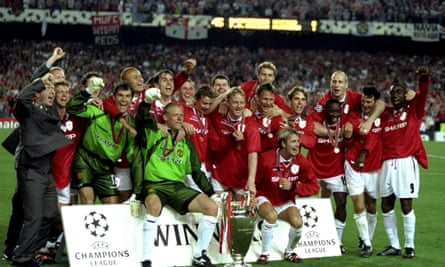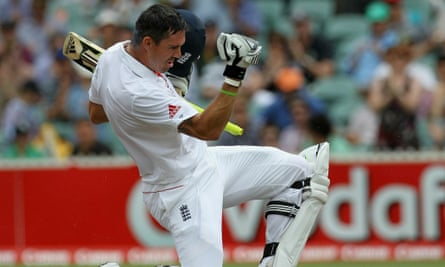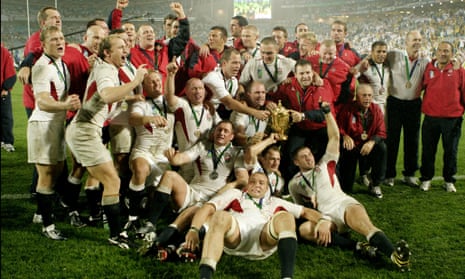England rugby team win World Cup in 2003
In the build-up to the 2003 Rugby World Cup, Sir Clive Woodward approached Prozone to build a technology solution that would give him the same insights that football coaches and clubs were using to support their tactical preparation and strategy.
Woodward was the first coach to adapt Prozone to rugby, installing it at Twickenham to collect data on how England and its opponents played. Data and performance analysis became an integral part of England’s preparations for the 2003 Rugby World Cup, which they went on to win, defeating Australia 20 points to 17.
Woodward explains how the analysis platform removed the preconceived notions they had about how other teams played, and the turning point was in seeing the opposition as data, rather than teams they’d never beaten before.
Speaking at the time, Woodward said, “Prozone gives you a birds-eye view of all the players, there is no hiding place. From a coach’s point of view it’s a brilliant system, it actually allows you to coach and I think it makes you a better coach and a better team.”

Manchester United win the treble in 1999
In 1999, Manchester United’s manager, Alex Ferguson, headhunted and recruited Steve McClaren, a young coach and the assistant manager at Derby County. McClaren requested Prozone, sports performance analysis technology, which he’d be deploying on a gratis basis at Derby.
Manchester United agreed to pay Prozone £50,000 if they won a trophy that year. The club used Prozone to analyse performance and inform team selection and tactical decisions, and that season, United won the treble: the Champions League; the Premier League; and the FA Cup. Prior to the United deal, Prozone had two non-paying customers, but after Manchester United’s victory, Prozone earned its first cheque, and by August 2000, six Premier League clubs were paying customers.
Since then, data has been used widely in professional football, notably during penalty shoot-outs. In the League Cup Final of 2009, during the Manchester United Vs Tottenham penalty shoot-out, video analysis took place in real-time on the field. While players had been using data analysis before, this was one of the first times it took place within a game.
Later in 2012, Manchester City collaborated with OptaPro to release data into the public domain for the very first time. Manchester City intended to play their role in bringing amateur analysts to the forefront and to clubs’ attention.

England cricket team Ashes victory 2010/2011
The England cricket team has been heavily influenced by the Moneyball success story. Much in the same way that Alderson inspired Beane at Oakland, Peter Moores introduced Andy Flowers to ‘Moneyball’. Flowers oversaw the expansion of the ECB performance analysis unit, particularly the crucial appointment of Nathan ‘Numbers’ Leamon, as match analyst.
Their most notable success, according to Bill Gerrard, professor of business and sports analytics at Leeds University, was the Ashes tour Down Under in 2010/11 “when data analysis played a crucial role in identifying the strengths and weaknesses of the Australian team” with effective tactics developed, tested by simulations, to counter the opposition strengths and exploit their weaknesses.

British cycling team become the most successful British team in any sport at a world and Olympic level
Prior to Athens 2004, British gold medals in cycling had been sporadic. Under the direction of British Cycling performance director, Sir Dave Brailsford, Athens saw the first results of Brailsford’s now famous rigorous marginal gains philosophy, which involves examining every aspect of performance to extract small advantages, which collectively add up to a decisive winning margin.
In the 11 years that Brailsford led the Great Britain Cycling Team – he announced his retirement from the role in April 2014 – the squad became the most successful British team in any sport at a world and Olympic level.
Jonathan Leeder, physiologist at the English Institute of Sport, explains in cycling: “You’re going from A to B as fast as you possibly can. You’re not too bothered about what other nations are doing – you just need to be the fastest. So we use historical data to predict the winning time for the next Olympics, and then invest resource into what it takes to do that time and train athletes appropriately. It’s you against the clock.”

Oakland A’s baseball team win 20 consecutive games, an American League Record
For the last 20 years, Oakland Athletics, a small-market team in major league US baseball, has used data analysis as a strategy to become competitive with the big-market giants such as the New York Yankees. Using insights from sabermetrics – the statistical analysis of baseball – to drive their player recruitment strategies, Oakland have made themselves the most efficient team in major league baseball in terms of wins per dollar spent.
The approach started under their general manager, Sandy Alderson, but really took off under his successor, Billy Beane. Beane’s achievements – and the team’s iconic success – in the 2001 and 2002 seasons were propagated in the best-selling book, Moneyball, by Michael Lewis published in 2003 and subsequently turned into an Oscar-nominated movie with Brad Pitt.
According to Bill Gerrard, who considers Beane “a great friend and mentor,” the impact of Moneyball on sports analytics “cannot be underestimated. It, more than anything else, has put the potential gains of data analysis on the agenda of elite sports around the world.”
Eleanor Dallaway is editor of Infosecurity magazine.
The Creative Data hub is funded by Accenture. All content is editorially independent except for pieces labelled ‘Brought to you by Accenture’. Find out more here.

Comments (…)
Sign in or create your Guardian account to join the discussion